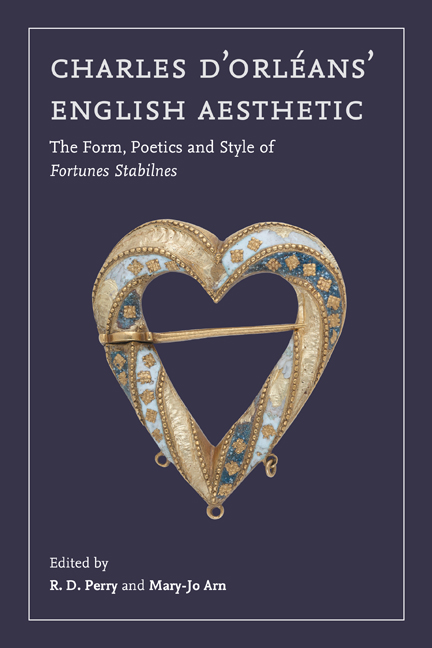Book contents
- Frontmatter
- Dedication
- Contents
- List of Illustrations
- List of Contributors
- Acknowledgements
- Abbreviations
- Introduction
- 1 The Two Dreams of Charles d’Orléans and the Structure of His English Book
- 2 Charles d’Orléans’ Cross-Channel Poetics: The Choice of Ballade Form in Fortunes Stabilnes
- 3 The English Roundel, Charles’s Jubilee, and Mimetic Form
- 4 A Grieving Lover: The Work of Mourning in Charles’s First Ballade Sequence
- 5 Charles d’Orléans’ English Metrical Phonology
- 6 The English Poetry of a Frenchman: Stress and Idiomaticity in Charles d’Orléans
- 7 Verb Use in Charles d’Orléans’ English
- 8 Charles d’Orléans and His Finding of English
- 9 Aureation as Agon: Charles d'Orléans versus John Lydgate
- 10 Charles d’Orléans, Harley 682, and the London Book-Trade
- 11 The Form of the Whole
- Select Publications, 2007–2020
- Index
3 - The English Roundel, Charles’s Jubilee, and Mimetic Form
Published online by Cambridge University Press: 14 October 2020
- Frontmatter
- Dedication
- Contents
- List of Illustrations
- List of Contributors
- Acknowledgements
- Abbreviations
- Introduction
- 1 The Two Dreams of Charles d’Orléans and the Structure of His English Book
- 2 Charles d’Orléans’ Cross-Channel Poetics: The Choice of Ballade Form in Fortunes Stabilnes
- 3 The English Roundel, Charles’s Jubilee, and Mimetic Form
- 4 A Grieving Lover: The Work of Mourning in Charles’s First Ballade Sequence
- 5 Charles d’Orléans’ English Metrical Phonology
- 6 The English Poetry of a Frenchman: Stress and Idiomaticity in Charles d’Orléans
- 7 Verb Use in Charles d’Orléans’ English
- 8 Charles d’Orléans and His Finding of English
- 9 Aureation as Agon: Charles d'Orléans versus John Lydgate
- 10 Charles d’Orléans, Harley 682, and the London Book-Trade
- 11 The Form of the Whole
- Select Publications, 2007–2020
- Index
Summary
Charles's English and French narratives end differently, their paths diverging just before Fortunes Stabilnes presents its second series of lyrics, a set of short poems called roundels in English. The speaker (referred to as Charles, the duke of Orleans, in both texts and thus identifiable to some degree with the real-world author) having withdrawn from the service of Love after the death of his lady, the French narrative ceases without a fully articulated end or closing frame. The chansons (as roundels are known in French) are separate from the lyric-narrative sequence and placed later in Charles's personal manuscript. Fortunes Stabilnes continues beyond the point at which the French halts, first presenting 103 roundels (of which 96 are extant, the first 52 having equivalents which appear in the chanson section of the French volume) and then, following a dream-vision encounter with Venus and Fortune which leads the narrator to the pursuit of a new woman, a second sequence of ballades. Both ballade series are epistolary, lyrics sent from the lover to his lady.3 Yet the roundels, contrastingly, are dishes in a metaphorical feast, a jubilee hosted by the first-person speaker for his audience of ‘yow louers all’ (3134).
Why did Charles embed the roundels within the English sequence, yet separate the chansons from the French narrative? This difference in treatment suggests that roundels possessed an identity different from their equivalent chansons, distinctions which this chapter reconstructs through a micro-history of the form. Middle English roundels (excepting Charles’s examples) are rare, though this chapter adds four more to the total. Moreover, what is particular about their rarity has been overlooked: they are not scattered in time and place but, rather, cluster in a particular historical moment and a particular social milieu within which Charles's roundels sit at the centre. Their currency and social cachet explain what motivated Charles to include them within Fortunes Stabilnes. Inclusion within Charles's English book necessitates a distinctive mode of literary representation for the jubilee, one which presents verse-form mimetically as an event enacted for readers.
- Type
- Chapter
- Information
- Charles d’Orléans' English AestheticThe Form, Poetics, and Style of Fortunes Stabilnes, pp. 82 - 101Publisher: Boydell & BrewerPrint publication year: 2020



